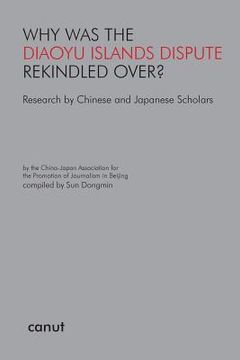Why was the Diaoyu Islands Dispute Rekindled Over?: Research by Chinese and Japanese Scholars (en Inglés)
Reseña del libro "Why was the Diaoyu Islands Dispute Rekindled Over?: Research by Chinese and Japanese Scholars (en Inglés)"
The China-Japan Association for the Promotion of Journalism in Beijing has initiated, arranged and presided over the compilation of this book.The year 2012 marked the 40th anniversary of the normalization of diplomatic relations between China and Japan. The China-Japan relations should have been further deepened in this memorable year. However, Japan's unlawful "purchase" of the Diaoyu Islands and "nationalization" of the Diaoyu Islands severely infringes upon China's territorial sovereignty and greatly hurt the Chinese people's feelings, which has resulted in the unprecedented grim situation of China-Japan relations. Moreover, far-sighted people from the two countries have been more and more anxious about this issue. As we all know, the Diaoyu Island and its affiliated islands have been China's sacred territory since ancient times. This is supported by historical facts and jurisprudential evidence. The Diaoyu Islands were first discovered, named and exploited by the Chinese people. Since the Ming Dynasty, the Diaoyu Islands have been put under the jurisdiction of China's naval defense. The waters surrounding Diaoyu Island are traditionally Chinese fishing ground. Although the Diaoyu Island and its affiliated islands are uninhabited, they have never been "terra nullius". China is the indisputable owner of the Diaoyu Islands. As an inherent territory of China, the Diaoyu Islands shouldn't be a problem. Japan's illegal seizure and occupation of the Diaoyu islands in 1895 has caused the current dispute. During the Sino-Japanese War, taking advantage of the Qing government's undoubted failure, Japan incorporated the islands under the administration of Okinawa secretly. Then, Japan seized the islands for a long term by signing of the Treaty of Shimonoseki. After the end of World Anti-Fascist War, Japan surrendered unconditionally and accepted the Potsdam Declaration that determined that all territories, including the Diaoyu Islands, occupied by Japan during its invasion of China be returned to China. However, the US and Japan had underhand secret dealings. In December, 1953, the US Civil Administration of the Ryukyu Islands expanded its jurisdiction to the Diaoyu Islands without any form of jurisprudential justification. On June 17th, 1971, Japan and the United States signed Okinawa Reversion Agreement in order to hand over Okinawa to Japan, and the Diaoyu Islands were mapped into the handover area. Chinese government solemnly declared that such a move was flagrant, totally illegal and invalid; it couldn't change China's territorial sovereignty over the Diaoyu Island and its affiliated islands.

